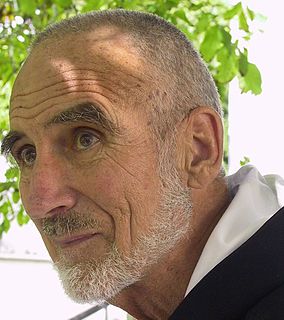A Quote by Steven Pinker
It's the old idea that the process of evolution is some push in the direction of greater complexity--in particular greater intellectual complexity. In one twig of the tree of life, namely ours, having a big brain happened to have advantages. But that's just what worked for a particular species of primate 5 to 7 million years ago.
Related Quotes
Seen in retrospect, evolution as a whole doubtless had a general direction, from simple to complex, from dependence on to relative independence of the environment, to greater and greater autonomy of individuals, greater and greater development of sense organs and nervous systems conveying and processing information about the state of the organism's surroundings, and finally greater and greater consciousness. You can call this direction progress or by some other name.
The world is a thing of utter inordinate complexity and richness and strangeness that is absolutely awesome. I mean the idea that such complexity can arise not only out of such simplicity, but probably absolutely out of nothing, is the most fabulous extraordinary idea. And once you get some kind of inkling of how that might have happened ' it's just wonderful. And . . . the opportunity to spend 70 or 80 years of your life in such a universe is time well spent as far as I am concerned.
We need merely understand that the evolutionary process is neither random nor determined but creative. It follows the general pattern of all creativity. While there is no way of fully understanding the origin moment of the universe we can appreciate the direction of evolution in its larger arc of development as moving from lesser to great complexity in structure and from lesser to greater modes of consciousness. We can also understand the governing principles of evolution in terms of its three movements toward differentiation, inner spontaneity, and comprehensive bonding.
The brain immediately confronts us with its great complexity. The human brain weighs only three to four pounds but contains about 100 billion neurons. Although that extraordinary number is of the same order of magnitude as the number of stars in the Milky Way, it cannot account for the complexity of the brain. The liver probably contains 100 million cells, but 1,000 livers do not add up to a rich inner life.
The evolutionary vision is agnostic in regard to systems in the universe of greater complexity than those of which human beings have clear knowledge. It recognizes aesthetic, moral, and religious ideas and experiences as a species, in this case of mental structures or of images, which clearly interacts with other species in the world's great' ecosystem.
If there is anything the artist or a true work of art teaches us, it is that variety and complexity really increase the unity, and that to achieve unity within a great variety of complexity is a greater achievement and more satisfying piece of art than to achieve unity with just a few elements, which is relatively easily achieved.
For as to the dispersing of Books, that Circumstance does perhaps as much harm as good: Since Nonsense flies with greater Celerity, and makes greater Impression than Reason; though indeed no particular species of Nonsense is so durable. But the several Forms of Nonsense never cease succeeding one another; and Men are always under the Dominion of some one or other, though nothing was ever equal in Absurdity and Wickedness to our present Patriotism.
If we want to postulate a deity capable of engineering all the organized complexity in the world, either instantaneously or by guiding evolution, that deity must have been vastly complex in the first place. The creationist, whether a naive Bible-thumper or an educated bishop, simply postulates an already existing being of prodigious intelligence and complexity. If we are going to allow ourselves the luxury of postulating organized complexity without offering an explanation, we might as well make a job of it and simply postulate the existence of life as we know it!



































